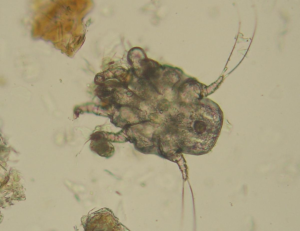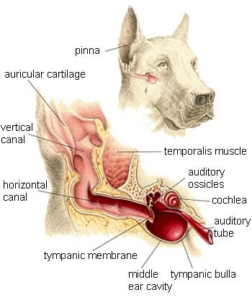Otitis
It’s probably not ear mites!
Otitis is the medical term for inflammation of the ear, or an ear infection. It is classified according to location. Otitis externa refers to inflammation of the outer canal, otitis interna refers to inflammation of the detailed organs that transmit sound, and otitis media refers to inflammation of the tympanum and ossicles. A single ear infection can be an easy thing to treat. When these ear infections become chronic, it can be a frustrating situation. The images show the sections of the ear, the second image is a picture of a healthy tympanic membrane
How to recognize an ear infection–
- Head shaking
- Scratching at ears
- Rubbing the face and head on floors and furniture
- Discharge
- Odor
- For inner and middle ear infections, you may notice dizziness, lacking coordination, and a head tilt.
What causes an ear infection?
The ear is a perfect place to set up an infection. It is warm, dark, and moist; a perfect home for yeast and bacteria.
A simple ear infection may start with some water, dirt, or debris. However, when these become chronic, we often start to discuss the possibility of a food allergy.
A food allergy? Affecting the ear?
Yes! Food allergies are almost always to blame in chronic, difficult to treat ear infections. Unlike people, dogs almost always experience an allergy to the protein source in their food. Most commonly this is chicken.
How is an ear infection diagnosed?
Ear infections are diagnosed by cytology. A swab of the ear is stained and looked at under the microscope. In this way, the proportion of yeast and bacteria can be quantified. Some infections are primarily yeast, and some are primarily bacteria.
How are ear infections treated?
Your veterinarian will prescribe a medication that will treat the organisms seen on the cytology. This is usually placed in the ear twice daily.
In addition, regular ear cleanings will remove debris from the ear, and keep the ear dry and less hospitable for microorganisms.
For chronic ear infections, it is often necessary to change to a hypoallergenic diet, or at least a novel protein diet. This diet should be from a single protein source, and should be a novel protein that the pet has not eaten before. Venison, bison, fish, and sometimes even Kangaroo are ideal novel protein diets. Remember, when a pet is on a hypoallergenic diet, no table scraps, treats, supplements etc. can be administered.
What about ear mites?
Ear mites can be a very real problem. Ear mites are ruled out by an examination and by swabbing the ear. Young dogs and cats are more susceptible to ear infections caused by ear mites. Over the counter ear mite treatments should not be used unless a veterinarian has verified the presence of ear mites. Using an over the counter product in an ear that does not contain mites will not truly treat the problem.










